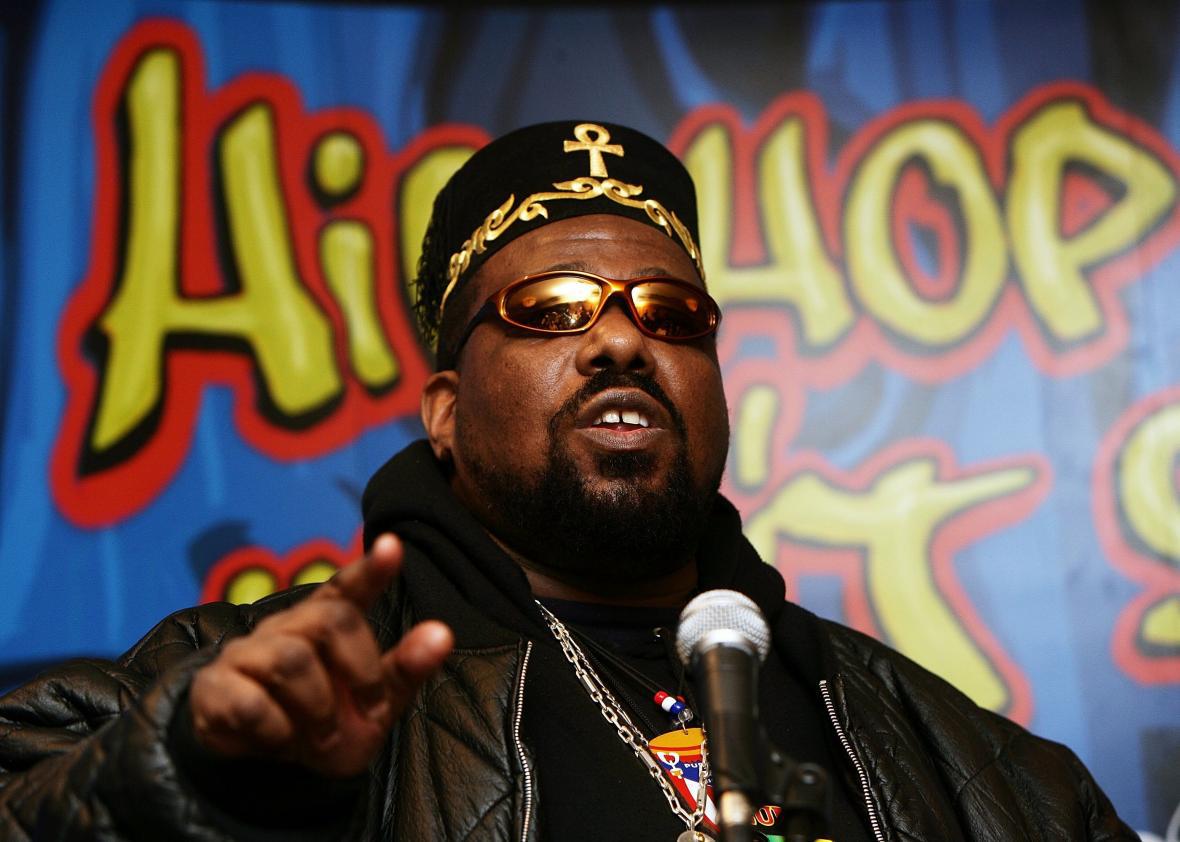On Saturday, the New York Daily News published the accounts of three more men who claim they were sexually abused by legendary hip-hop star Afrika Bambaataa when they were children. The revelations were provoked by former music industry executive and Democratic Party activist Ronald Savage’s decision to go public with his own story of being molested by Bambaataa. “I know what Ronald Savage is saying is true because he did it to me,” a 50-year-old New York man, who requested anonymity, told the Daily News. “I have never spoken to anybody about this and when I did, I said ‘Holy shit, they finally caught up to him.’ ”
It’s unclear what practical effect, if any, the allegations will have on Bambaataa, who is 59. Zulu Nation, the hip-hop organization he founded in the 1970s, has accused the Daily News of collaborating with the government and the police on a devious smear campaign. Zulu Nation also reportedly reached out to Hassan Campbell, one of the accusers, after he posted an angry video; Campbell says that in a meeting, Bambaataa apologized for the abuse and promised to seek counseling, open a center for troubled youth, and step down from his post at the head of Zulu Nation. “He never did any of those things,” Campbell told the Daily News. “He’s a manipulator and a liar. He’s just waiting for this chaos to blow over so he can go back to his dark, dingy hole and go back to his old ways.”
Savage, however, had a particular motive in coming forward now: He wanted his story to lend ammunition to New York Democrats’ efforts to do away with the state’s restrictive statute of limitations in cases of child sexual abuse.
New York’s statute of limitations is among the strictest in the country—on par only with Alabama’s, Michigan’s, and Mississippi’s, according to the advocacy group SOL Reform. Victims in New York can only sue up to the age of 23; what’s more, those abused within public institutions, including in schools or in foster care, must file an “intent to sue” within 90 days of the original incident. Efforts to extend or eliminate the statute have gotten nowhere: Democratic Assemblywoman Margaret Markey has been regularly introducing such legislation since 2006 but has never prevailed over an opposition led by elements of the Catholic Church.
But this year could be different. In early April, New York Attorney General Eric Schneiderman wrote to the Republican Senate majority leader and the Democratic assembly speaker, calling the law “unconscionable” and urging, “The Legislature has discussed and debated this issue for years, and now it is time to act.” Now, two Democratic lawmakers, Sen. Brad Hoylman and Senate Minority Leader Andrea Stewart-Cousins, have introduced a comprehensive bill that would do away with the statute of limitations altogether, in both civil and criminal cases, and would also remove the 90-day “intent to sue” requirement. Though the new law would not apply retroactively, it would introduce a one-year “window” in which victims prevented from bringing cases under the old requirements could come forward with suits. (Other states, including Minnesota, California, and Delaware, have passed similar “window legislation.” California’s one-year open period, in 2003, triggered about 1,000 new claims, most of them against Catholic dioceses.) The Daily News reports that 21 lawmakers in the Republican-controlled Senate currently support the legislation. It takes 32 votes to pass a bill.
Bambaataa isn’t the only alleged predator who has recently been rendered impervious by a statute of limitations. Former House Speaker Dennis Hastert will be sentenced later this month for illegal bank withdrawals that he used to pay off a 14-year-old boy—one of five he is accused of abusing. Hastert faces a maximum of five years in prison and would likely be in for far more if his alleged victims’ windows of opportunity hadn’t long ago expired. Illinois abolished its statute of limitations in 2014, but the new law doesn’t apply to old cases like Hastert’s.
A case against Bill Cosby was filed just under the wire this winter in Pennsylvania, where the statute of limitations for rape and sexual assault is 12 years, as opposed to New York’s five years. “The differing statutes of limitations across state lines create a ZIP code lottery,” the writer Jill Filipovic observed at the time. “Where a person is assaulted shouldn’t determine whether she gets justice.” Filipovic acknowledges the concern that eradicating statutes could “create chaos and a flood of reports of decades-old crimes,” but argues, “The 16 states with no statute of limitations for rape or sexual assault are not overwhelmed with huge numbers of stale claims.”
In New York, the Democratic bill still faces an uphill climb. Senate Majority Leader John Flanagan has promised to review it but has not indicated his own position; Gov. Andrew Cuomo has also been noncommittal. But Bambaataa’s alleged victims have given a face to their side of the debate. Savage says that he had suicidal thoughts and struggled to form intimate relationships for decades after he was abused at 15. “People don’t understand that you are scared,” he told the Daily News. “You’re scared if you tell on this person, what are they going to do to you, what you’re going to do to your family. … I think the statute of limitations is unfair for victims. It took me all of these years to speak about this. I was embarrassed. I was ashamed.”
